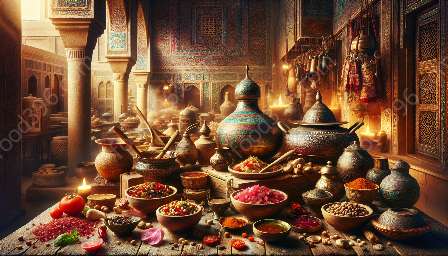When discussing Egyptian cuisine, it's impossible not to delve into the deep historical roots and cultural influences that have shaped it over centuries. The food of Egypt reflects the country's rich history, with a blend of ancient and modern flavors and ingredients creating a unique culinary experience.
Historical Overview
Egyptian cuisine has been influenced by numerous civilizations and cultures, including the ancient Egyptians, Persians, Greeks, Romans, and Arabs, as well as the Ottomans and the French. Each of these influences has left its mark on the food and culinary traditions of the region, contributing to the diverse and vibrant array of dishes found in modern-day Egyptian cuisine.
Ancient Roots
The foundation of Egyptian cuisine can be traced back to the ancient Egyptians. Staple ingredients such as wheat, barley, and ancient grains like emmer and einkorn were cultivated along the Nile River valley, forming the basis of the Egyptian diet. The ancient Egyptians also prized honey, figs, dates, and other fruits, which are still commonly used in Egyptian cooking today.
The ancient Egyptians were also known for their skill in breadmaking and brewing beer, both of which remain integral to Egyptian cuisine. The tradition of communal eating and sharing food, an essential aspect of modern Egyptian culture, can also be traced back to ancient Egypt.
Influences of Middle Eastern Cuisine
Egyptian cuisine shares many similarities with the broader culinary traditions of the Middle East. Common ingredients such as olive oil, garlic, onions, and a rich array of spices and herbs are shared across the region, with slight variations in how they are used in different countries.
The introduction of Islam in Egypt also brought new culinary practices, including the emphasis on hospitality and the development of intricate culinary techniques. Middle Eastern ingredients and culinary techniques, such as the use of tahini, falafel, and stuffed grape leaves, have all become integral parts of Egyptian cuisine, reflecting the historical and cultural ties between Egypt and its Middle Eastern neighbors.
Modern Influences
In recent years, Egyptian cuisine has also embraced modern influences, with globalization and increased connectivity leading to the incorporation of new ingredients and culinary styles. Urbanization and the influx of diverse cultures have further enriched the culinary landscape, leading to innovative fusions of traditional Egyptian dishes with international flavors.
The popularity of street food, such as koshari, baladi bread, and ful medames, has grown both locally and internationally, showcasing the adaptability and appeal of Egyptian cuisine in a modern context.
Key Ingredients and Dishes
Core ingredients in Egyptian cuisine include staples like beans, lentils, rice, and vegetables, as well as aromatic herbs and spices such as cumin, coriander, garlic, and parsley. Meat, particularly lamb and poultry, is also widely used, often cooked with traditional methods such as grilling, stewing, or roasting.
Notable dishes in Egyptian cuisine include koshari, a beloved street food made from rice, lentils, and pasta, topped with a spicy tomato sauce and fried onions. Ful medames, a hearty stew of cooked fava beans, is another iconic dish, often served with eggs, pita bread, and an assortment of condiments.
Summing Up
Egyptian cuisine represents a harmonious blend of ancient and modern influences, reflecting the historical and cultural tapestry of the region. From its ancient roots along the banks of the Nile to the contemporary fusion of flavors in bustling urban centers, Egyptian cuisine continues to captivate and enthrall both locals and visitors alike with its unique and diverse offerings.


